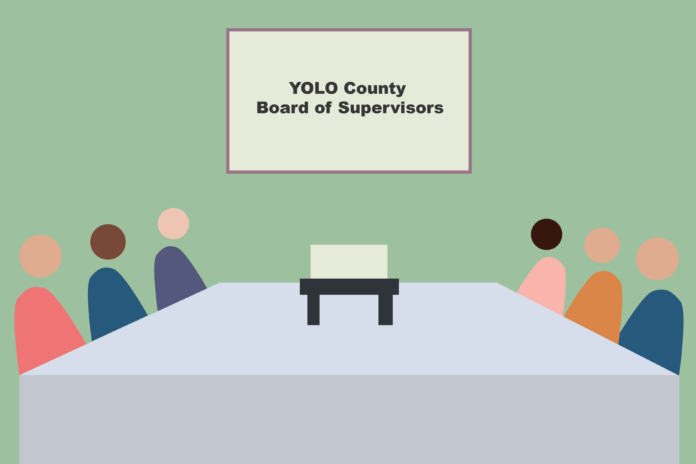Growing calls for the City of Davis to institute own resolution are prompted by recent attacks against Asians and Asian Americans
The COVID-19 pandemic has led to an increase in anti-Asian hate crimes across the country due to the scapegoating of Asians and Asian Americans as the cause for the coronavirus. Recent attacks against Asian seniors have caused outrage in the community, which has called for further protection from anti-Asian violence.
A resolution that condemns anti-Asian violence was approved unanimously by the Yolo County Board of Supervisors at the meeting on Feb. 23.
Yolo County Supervisor Gary Sandy explained that the resolution was unanimously approved by the Board of Supervisors in a five-to-zero vote.
“The Board unanimously approved the resolution, which calls for stronger protection of members of our Asian community who have been under violent attacks, verbal harassment and reprisals in recent history,” Sandy said.
Sandy further explained how the resolution was brought to him by one of his constituents, Lisa Yep Salinas, who had been victim to multiple incidents of anti-Asian racism.
Yep Salinas, a Yolo County resident and survivor of multiple anti-Asian racist incidents, described how she was a victim of six racist incidents since the beginning of the COVID-19 pandemic. Some of these incidents occurred at local grocery stores or in the parking lot, where the agitators blamed her for COVID-19, swore at her, used racial slurs and even physically assaulted her.
“I had to use a grocery cart to defend myself,” Yep Salinas said. “I hope it never happens to anyone else.”
After President Joe Biden released a memorandum on Jan. 26 “condemning and combating racism, xenophobia, and intolerance against Asian Americans and Pacific Islanders,” Yep Salinas was inspired to suggest a resolution to Yolo County and other local entities to prevent the same racist incidents from happening to anyone else.
“People are being harassed on the job, in public, in the streets—wherever they go—and people are being murdered,” Yep Salinas said. “We need to stop this.”
Senior Historian of the Bulosan Center for Filipino Studies Stacey Salinas noted how the model minority myth has contributed to the rise in anti-Asian hate crimes.
“Our elders are seen as more vulnerable—more likely to be unable to speak out against these types of crimes because they’re older,” Salinas said. “Asians are usually seen as submissive and more quiet to represent more of the model minority myth.”
Sandy explained how Yolo County has had anti-Asian racist incidents prior to the pandemic, such as the racially-motivated murder of Thong Hy Huynh at Davis Senior High School in the 1980s.
“Yolo County was unfortunately the site of a horrific murder of an Asian youth in Davis many, many years ago,” Sandy said. “That has haunted many of us who have lived in the county for a great many years.”
Salinas addressed the long history of oppression against Black, Indigenous and People of Color (BIPOC) in general in the United States.
“We all have different circumstances—meaning different histories of oppression—but at the end of the day, all the different ethnic groups or racial groups, share a common goal in challenging white supremacy,” Salinas said. “That’s where we find common ground.”
Sandy detailed how Yolo County has had an extensive history of Asian involvement in the community such as farm labor and railroad construction. He also listed notable Asian leaders in the community including, but not limited to, Mariko Yamada, a former Yolo County Supervisor and later Democratic assemblywoman, Ruth Asmundson, a former mayor of Davis and John Kimura, a former mayor of Woodland.
Sandy stated his hopes that the new resolution will begin a discussion about how anti-Asian racism does exist in Yolo County, and how residents cannot be complacent when it occurs.
“We need to take steps to make sure that people have an opportunity to understand the Asian community, that we promote the many ways that the Asian community makes so many positive contributions to life and culture here and to the extent of Asian history that pre-exists so many of us,” Sandy said. “I believe that with greater understanding will come greater tolerance or acceptance over time.”
Salinas further addressed her hopes for the Asian/Pacific Islander American (APIA) community in continuing to defy Asian stereotypes and fight for equity.
“We’re challenging the model minority myth, and we’re showing America that we are not silent, we are not docile, we are not the model minority myth,” Salinas said. “In fact, we’re actually really aggressive when it comes to making sure that equity for all is the main platform that we’re advocating for.”
Yep Salinas urged the UC Davis and wider Davis community to email and call the Davis City Council about adopting a resolution specifically for the city of Davis. This item will be discussed in the next city council meeting on March 9, according to Yep Salinas.
Yep Salinas also added a final note regarding the future of anti-Asian racism in regards to the pandemic.
“COVID-19 has been so brutal—we need to come together stronger as a community to help and protect and respect each other so that we can survive into the next couple years,” Yep Salinas said. “Hating or brutalizing or being violent on the Asian/Pacific Islander (API) community is not a solution.”
Written By: Jelena Lapuz — city@theaggie.org




